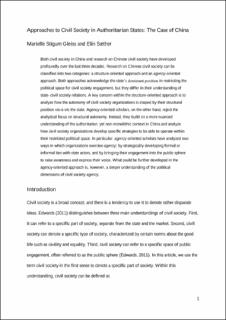| dc.description.abstract | Both civil society in China and research on Chinese civil society have developed profoundly over the last three decades. Research on Chinese civil society can be classified into two categories: a structure-oriented approach and an agency-oriented approach. Both approaches acknowledge the state's dominant position in restricting the political space for civil society engagement, but they differ in their understanding of state–civil society relations. A key concern within the structure-oriented approach is to analyze how the autonomy of civil society organizations is shaped by their structural position vis-à-vis the state. Agency-oriented scholars, on the other hand, reject the analytical focus on structural autonomy. Instead, they build on a more nuanced understanding of the authoritarian yet nonmonolithic context in China and analyze how civil society organizations develop specific strategies to be able to operate within their restricted political space. In particular, agency-oriented scholars have analyzed two ways in which organizations exercise agency: by strategically developing formal or informal ties with state actors and by bringing their engagement into the public sphere to raise awareness and express their voice. What could be further developed in the agency-oriented approach is, however, a deeper understanding of the political dimensions of civil society agency. | en_US |
